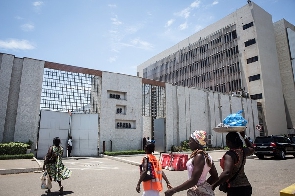To reduce the alarming cases of staff-orchestrated fraud in banks, the regulator – Bank of Ghana – has ordered banks to take a raft of measures, which include taking staff through police vetting to determine whether they have any criminal history, before employing them.
This comes after the Banking Industry Fraud Report published by the Bank of Ghana revealed that the industry’s reported fraud in 2019, largely committed or aided by staff, increased by more than 5.5 percent – recording 2,295 cases and valued at GH¢115 million.
Approximately GH¢33.4 million representing 28.9 percent of this amount was reported as losses; and 71 percent, i.e. GH¢82 million, were unsuccessful attempts or recovered.
Among the directives and guidelines to curb this unscrupulous behaviour, the regulator has required contract or temporary staff of banks and specialized deposit-taking institutions to be adequately vetted by the Police Service in order to curtail the practice of employing fraudsters in the industry.
It adds that Licenced institutions are required to strictly monitor staff (including contractual staff) and every transaction executed by staff, by implementing appropriate internal controls.
For one type of fraud – suppression of cash and deposits, cases increased by 43.1 percent from 1,239 cases in 2018 to 1,774 cases in 2019. The total value of reported cases under this fraud type was GH¢5.05 million, with a loss amount of GH¢4.07 million.
This type of fraud accounted for the largest portion of reported cases, with 94 percent of those cases being perpetrated by staff of the banks. Staff who suppressed cash or deposits were usually ‘frontline staff’, particularly tellers, mobile bankers or sales agents.
To control the human element in the fraud, the regulator advises that remuneration and working conditions of contract staff and mobile bankers in banks and specialised deposit-taking institutions should be reviewed and aligned to that of permanent staff, since they are often found to be involved in suppressing the value of cash and deposits.
Again, cases relating to cyber-crime involving email fraud, crime perpetrated through Internet banking and other localised payment and mobile banking platforms during the year under review decreased by 34.4 percent, from 174 cases in 2018 to 114 cases in 2019.
However, despite the decrease in 2019, cyber fraud accounted for the highest value of attempted fraud; amounting to GH¢50.5 million, with actual loss of GH¢14.3 million.
Thus, the Bank of Ghana says, consumers should use efficient electronic payment methods that keep an audit trail of fund movements, even as banks and specialized deposit-taking institutions enforce directives and due diligence on ‘over the counter’ payments.
Furthermore, the Bank of Ghana has advised telecommunication companies to enhance their registration and monitoring processes in order to significantly reduce the incidence of fraudulent call diversion, chip-swaps and number porting; plus, enhancing their cyber security infrastructures to prevent unauthorised access in line with the regulator’s requirements.
The report shows rural and community banks reported 55 percent of the total cases, and commercial banks and savings and loans institutions reported 23 percent and 22 percent of the cases respectively. In total, 83 institutions reported cases in 2019 as compared to 72 in 2018.
When it comes to cheque fraud, the number of cases increased marginally by 2.5 percent from 39 cases in 2018 to 40 cases in 2019. This includes fraud incurred as a result of cloned cheques, stolen cheque leaflets and cheque alteration.
Notable however, the report says, is the increase in number of cases reported as cheque cloning, which originates from the operation of syndicates involving staff of financial institutions, telecommunications companies and cheque-printing houses.
Also, fraud cases reported by financial institutions regarding manipulation of accounts and negotiable instruments resulted in attempted fraud values of approximately GH¢38.8million, of which GH¢33.06million was recovered and GH¢5.7million lost.
With this particular type of fraud too, according to the report, over 80 percent of perpetrators for all cases reported were staff of the financial institutions. Staff in question mostly manipulated the internal accounts and dormant salary accounts of customers.
Business News of Monday, 17 August 2020
Source: thebftonline.com

















